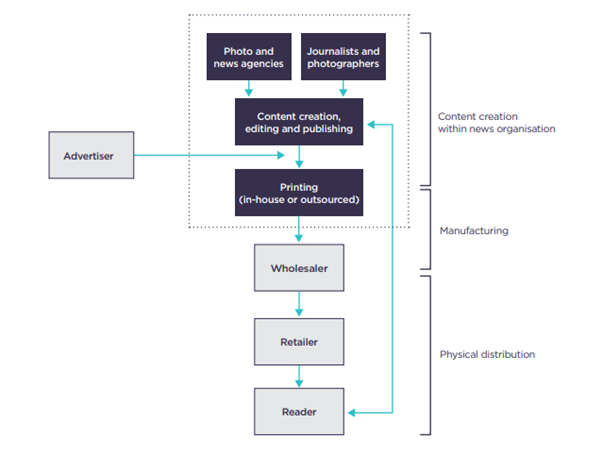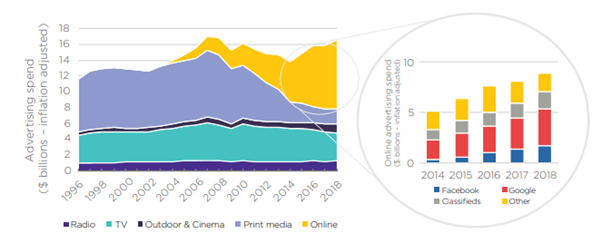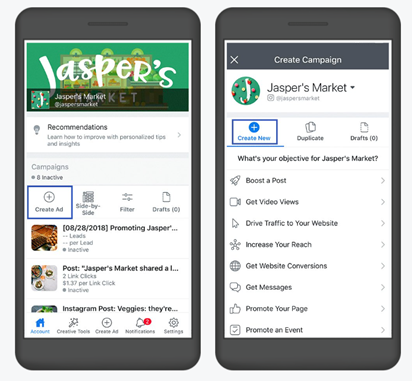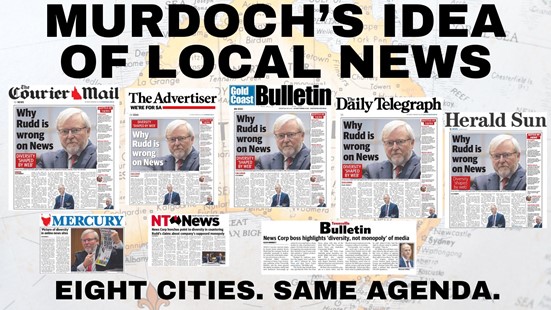Did Facebook and Google steal advertising dollars from news media?
The diagram below, showing the traditional newspaper value chain, is from the ACCC’s Digital Platforms Inquiry Report. It illustrates the control traditional print media companies once exercised across the entire value chain from content creation to distribution, a highly lucrative business model. The traditional print media companies profited from selling each newspaper in addition to capturing the advertising buried within. If you wanted to reach your audience, you needed to advertise in the newspaper, which owned a “regional monopoly”.

Enter the internet
The internet, the most disruptive technology in a generation, allowed news publishers and journalists to reach readers directly without requiring large investments in printing presses or distribution. The “regional monopoly” was broken and with it the geographic stranglehold that traditionally benefitted large news publishers.
Traditional publishers were very slow to react to the changing market dynamics, expecting to retain the lucrative classified business dubbed the ‘rivers of gold’, they chose to ignore the shift underway. New media businesses emerged and the classified business changed forever. The new competition benefited from a product that was cheaper, more timely and more engaging. Ultimately, traditional media ceded market share, predominantly in real estate and vehicles. Today the two companies dominating these categories are REA Group Ltd (market cap A$20B) and Carsales.com Ltd (market cap A$5B).
Around
the same time, Google and Facebook began to develop their advertising businesses.
They had one clear advantage over their traditional media peers, their ads were
measurable, solving one of the classic challenges of traditional advertising: the inability to measure success. This quandary
is captured in the famous quote by John Wanamaker.
“Half the money I spend on advertising is wasted; the trouble is I don't know which half.”
Print
media companies underwent what Andrew Groves, former chairman of Intel,
described as a 10x force. It
is important to understand this trend is not uniquely Australian; it happened
across the world. The image below highlights the shift within Australia, which
commenced around 2006.

Democratisation of advertising
Armed with data, the new advertising model thrived. It also brought new advertisers into the fold, including smaller advertisers who were previously excluded, leading to a democratisation of advertising. Today over 9 million small businesses advertise on Facebook globally allowing them to reach an audience previously unimaginable. Small businesses now have a voice, and an effective marketing tool, something that was only available to large brands with multi million-dollar campaign budgets.
Disintermediation also hit advertising agencies like WPP and Publicis. The advertising agency model was disrupted as advertisers chose to work directly with Google and Facebook to reach their target audience. Google and Facebook’s ad management tools allowed businesses of all shapes and sizes the ability to market directly to their potential customers. Below is an example of a Facebook advertiser tool which is simple to use and highly targeted.

Disruption has not only hit journalists. The role of ad agencies as the middlemen between publishers and businesses was also hit hard. Marc Pritchard, chief brand officer at Proctor & Gamble one of WPP’s biggest clients commented,
“It’s time to disrupt this archaic Mad Men model, eliminating the silos between creatives, clients and consumers, and stripping away anything that doesn’t add to creative output”
Even Sir Martin Sorrell the British businessman who founded WPP exited, starting a new business, S4, focused exclusively on digital advertising.
Democratisation of content
Another surprising benefit of this disruption has been the proliferation of content. Once only the domain of large publishers, small content creators once constrained by regional distribution have been able to reach their desired audience.
Take Livewire for example, its digital business model is facilitated by the internet allowing it to easily reach its audience with no heavy investment in printing or distribution. Livewire now boasts Australia’s fastest growing investment platform with more than 250,000 investors and advisors visiting the platform each month. This story has played out globally, with niche content publishers providing deep analysis which has not been well covered by large generic news media organisations.
Globalisation of content
Another trend has been the globalisation of content. Companies like the Wall Street Journal, the Financial Times, and New York Times all once constrained by a regional monopoly, are now able to freely market their services to readers wherever they are around the world. There is no need to wait for the physical newspaper to be air freighted from the UK or US to Australia. These publications now serve a global audience.
News media has been disrupted by the internet
News media proprietors are quick to suggest that journalism is under attack from the large technology giants. I don’t think that is a fair characterisation of the problem. The disruption of news media by the internet is a global phenomenon. Despite this, at the time of writing, both Google and Facebook have come to commercial agreements with Australian news media companies which will see them inject hundreds of millions into these businesses. Will this raise the standard of journalism in this country? Only time will tell.
Whatever the outcome, the media bargaining code does little to enhance diversity of thought and independent journalism in Australia. Rather it will further entrench media concentration which is already world leading. Rupert Murdoch’s News Limited owns about 70% of the nation’s print circulation, allowing it to control the agenda at a national level, which has a knock on effect to other media like radio and TV. Interestingly, in the days following the Senate enquiry established in response to a petition initiated by former Prime Minster Kevin Rudd, the Murdoch newspapers ran the same front page on their newspapers nationally. No matter your political persuasion, you can’t help but think there is a media concentration issue in this country which this code and the money from big tech does little to address.

The continued transition from traditional media to new media will not slow, which augers well for Google and Facebook. Undoubtedly, they will face continued pressure from governments seeking to support domestic journalism and media organisations, however we believe this is manageable. We continue to hold our investments in big tech despite the short term uncertainty as we have faith in the long term economics of the business model and their future growth potential.
Not already a Livewire member?
Sign up today to get free access to investment ideas and strategies from Australia’s leading investors.
5 topics
4 stocks mentioned

